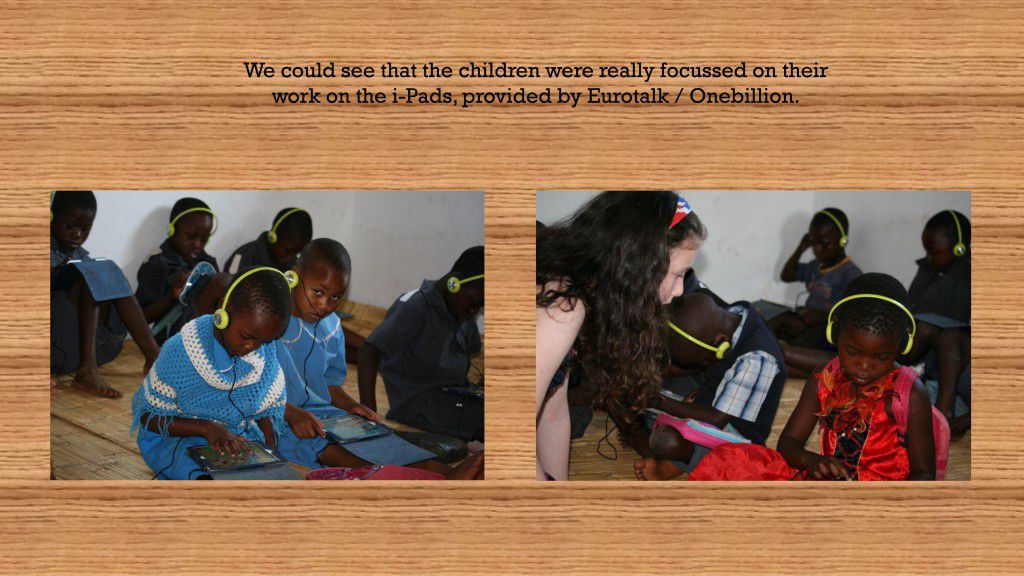A Language Journey
Today we’ve got a fantastic guest post from Kelly Wang – English teacher, accidental traveller, cake whisperer, dinosaur believer – on her personal language learning journey.
If you’ve got a language story to tell, we’d love to hear it! Now over to you, Kelly…
My journey through languages began in sequins and shoulder pads.
At the age of seven I remember clutching a Pot Noodle (Chow Mein flavour, if you must know), with an A4 pad in front of me and one of those 10 coloured pens ready and poised, waiting for the Eurovision Song Contest.
It has long been a tradition in my family to watch the Eurovision together, and to give marks out of ten to the acts. And at that age, I was of the opinion that English was the only language in the world, so my marking scheme would include whether or not the songs were in English. No English? Nil points.
I even took exception to the fact that each country when giving their own points spoke in their own language. How rude.
Fast forward to the last year of primary school and we learnt a few French words like bonjour and le livre and la fenêtre.
I still thought English was the best language.
But then, on reaching secondary school, when we started to learn a ‘modern foreign language’ regularly (in my case, French), I loved it. I loved the idea of being able to speak to everyone, no matter the language. And better than that, I was picking it up pretty easily.
The following year there was a repeat performance with learning German, and I remember a sort of teenage arrogance of thinking that languages were going to be ‘my thing’, because by the time I was sixteen I could also say Θέλω να πάω σπίτι in Greek – Thélo̱ na páo̱ spíti (I want to go home).
Over the years I’ve flirted with a lot of languages. I tried Chinese for a while, but with the complicated tonation, I was more worried about causing offence with the way I said a word, and less worried about actually stringing a sentence together.
And then, I found my true language love. The one language I could lose myself in and spend hours learning just for fun. The one language I would squeal over if I heard it spoken in public. Which is Finnish. Naturally.
Finnish may sound like an odd choice, but it made perfect sense to me. What started with a passing interest listening to Finnish metal music erupted into a bit of an obsession when I found myself frustrated that I couldn’t understand the Finnish ice hockey commentary.
For almost two years, Finnish became my number one hobby. Being relatively self-disciplined when it comes to studies, I decided to learn through a mix of self study and online language exchanges. Many an adventure was had along the way, and that perhaps is a story for another time, but I loved it. No prepositions to learn because everything was a suffix, and by changing the word ending you could say a whole range of things about it: saunassa, saunasta, saunan (in the sauna, from the sauna, for the sauna). No articles, no need to wonder if your table was a girl and your chair was a boy, it didn’t matter. Neither did you have to refer to a person as he or she, one simple han and it was covered! Beautiful.
Fast forward another year, and I found myself attempting to get to grips with Hungarian. Now for those of you who don’t know, Finnish and Hungarian are cousins of the language world, and it depends on which scholar you speak to as to how close a family they are. My experience was that whilst it sounded an awful lot like Finnish, Hungarian was nothing like it at all, except for the odd words like toilet: Hungarian – vécé, Finnish vessa.
And currently, I find myself in Spain. Adamantly not learning the language.
Because the problem now, with being a ‘jack of all trades, master of none’ when it comes to language, is that they all get tangled up. A waiter asks me if I want a refill, I answer in a mix of Spanish and Hungarian. I overhear staff in my local Chinese supermarket and confuse them – and myself – by responding in Chinese rather than Spanish. And recently on a stopover in Paris, I managed to respond to questions in French but found myself asking questions in Finnish.
What I really could do with is a babel fish. Or to live in the TARDIS. Unfortunately, I am in the wrong reality for that. But. I still love languages.
So. I don’t know what the foreign language for me is going to be. Should I return to French, attempt to master Finnish, or take up something new like Dothraki? Or will that lead to more unnecessary tongue twisting? I just don’t know. Would you like to join me on my journey?
Kelly
JLC winner Ella’s Malawi trip
Today we’re very excited to share a presentation from Ella Whittingham, from West Bridgford in Nottingham, who won the Junior Language Challenge in 2013. Ella and her family have just got back from her prize trip to Malawi, and we’re really glad to hear that they had a fantastic time! Read on to see what they got up to, and what this year’s champion, Yash, has to look forward to…
By the way, if you’d like to be kept informed about the Junior Language Challenge 2015, which will start in March, you can sign up to our mailing list on the JLC website. And to learn more about the work of onebillion at Ngwenya and other schools in Malawi, find them at onebillion.org.uk.
Click on any of the slides to see a bigger version.
Does speaking another language make you sexy?
The other day I discovered this article online. I already knew that Bradley Cooper spoke French, but was pretty happy when I realised that I could also listen to Johnny Depp, Ben Affleck and Colin Firth speaking various other languages too (French, Spanish and Italian, respectively). Being Grazia, the article is aimed at a female audience and only features male actors, but there are many famous women who also speak languages – Mila Kunis (Russian), Gwyneth Paltrow (Spanish), Natalie Portman (Hebrew) and Shakira (everything), among many others.
Here’s Bradley in action. I don’t speak French, unfortunately, so I have no idea what he’s saying, but it certainly sounds pretty good.
It’s easy to assume that movie and pop stars only speak English, because we only ever see them speak that language at the cinema or on TV. And let’s be honest, who hasn’t assumed at some point that because they’re rich and beautiful, they’re also lazy and probably not prepared to make the effort? As a result, we tend to be very surprised and make a big deal of it when we realise they do speak another language – even though, just like the rest of us, they went to school, go on holiday, have in-laws from another country to impress and sometimes may even need another language for work. So why is it so surprising?
Now – go to YouTube, search for ‘Bradley Cooper French’ and read some of the captions. Many of them say something along the lines of, ‘As if he couldn’t get any hotter…’ or ‘Bradley Cooper just keeps getting sexier!’ Which made me think – does speaking another language really make us sexy? And if so, surely this would be the perfect argument to encourage young people to keep going with languages at school? Never mind that they can get a better job, earn more, travel the world – if we could tell them it’ll make them more attractive to that girl/boy they fancy, maybe they’d be more interested.
 But of course not all men are Bradley Cooper or Johnny Depp (more’s the pity). So I have to wonder – is it the language that’s sexy, or the person speaking it? If Bradley Cooper were just Bradley from next door, would we be so impressed? I’m not sure that we would.
But of course not all men are Bradley Cooper or Johnny Depp (more’s the pity). So I have to wonder – is it the language that’s sexy, or the person speaking it? If Bradley Cooper were just Bradley from next door, would we be so impressed? I’m not sure that we would.
And also, why doesn’t this apply to all languages? If my experience of watching The Big Bang Theory is anything to go by, guys speaking Klingon tend not to have the same effect on women (for the most part – I know to some ladies it’s very attractive).
I’d love to hear what you think about this. Do you like someone more if they speak another language? Or is it just a nice bonus, which only applies to someone you already fancy? And will you be learning some French to impress your partner this Valentine’s Day? Let us know in the comments below 🙂
Liz
Rising Demand for English as a Foreign Language Reveals Spain’s Biggest Educational Bugbears
Today we welcome back guest blogger Eve Pearce, with an interesting article about the demand for language learning in Spain, and its implications for the future.
It is rather ironic that while numbers of Brits studying a foreign language to A-level have dropped dramatically over the past few years, nearby Spain – officially out of one of the deepest recessions in its history but still struggling in terms of its high rate of unemployment – is undergoing a veritable boom in foreign language study, with the English language taking pole position, since some 78 per cent of all job offers demand this language from successful candidates.
 The Spanish crisis, which has rocked the nation since its commencement in 2008, has also led to a greater demand for German and French language learning, since many Spaniards are considering migrating to these countries given the bleak economic forecast. In many private nurseries and schools, the study of Chinese is all the rage as well, since parents see this language as the difference that could make or break their child’s job application in the future. This level of competition is only logical, since the forecasted unemployment rate for 2014 stands at 26.4 per cent of the population. Vice-President of the European Commission and commissioner of Economic and Monetary Affairs, Olli Rehn, recently declared that although the unemployment rate in Spain has stabilised, it continues to be “unacceptably elevated”. The situation, he claimed, was similarly bleak in Italy.
The Spanish crisis, which has rocked the nation since its commencement in 2008, has also led to a greater demand for German and French language learning, since many Spaniards are considering migrating to these countries given the bleak economic forecast. In many private nurseries and schools, the study of Chinese is all the rage as well, since parents see this language as the difference that could make or break their child’s job application in the future. This level of competition is only logical, since the forecasted unemployment rate for 2014 stands at 26.4 per cent of the population. Vice-President of the European Commission and commissioner of Economic and Monetary Affairs, Olli Rehn, recently declared that although the unemployment rate in Spain has stabilised, it continues to be “unacceptably elevated”. The situation, he claimed, was similarly bleak in Italy.
Interestingly, despite the general consensus as to the value of learning foreign languages, the Mayor of Madrid, Ana Botella’s recent address to the Olympic Committee during Madrid’s bid to host the 2020 Olympics was deemed by many to be representative of the current failure of the public educational system to meet the demand for spoken English at an acceptable and truly functional level. In many ways, this is owing to the small number of hours dedicated to English in the public system curriculum, as well as the heavy focus on textbook-style teaching (which leans heavily on grammatical exercises) rather than on fluency and bilingualism/multi-lingualism. As a result, while most students are able to successfully complete intermediate-level exercises (involving the use of the simple past tense and conditionals, for instance), they are far less comfortable when asked to speak in public or to conduct business by phone. Meanwhile, those who are able to afford it are relying more on private classes with tutors, who are able to offer students conversational practise, one of the most sorely lacking activities in many schools and academies. Many adults (who are also flocking to EFL academies or completing online courses) frequently lament not having adequately learned English at the optimal point of their lives (i.e. in their early childhood) and now, more than ever, dreams of moving to greener pastures are being put on the back burner owing to this glaring failure in the system.
What, then, is the solution for this crisis-struck nation, at least in so far as language learning is concerned? There are a number of measures educators and those governing alike need to adopt, some of which may be:
An increase in the hours dedicated to English
If students are to gain the confidence they need to speak fluently in a variety of both social and professional settings, schools should consider not only elevating the number of hours dedicated to learning English, but also, perhaps, taking a leaf out of the book of many costly British and bilingual (Spanish-English) schools, where core subjects such as mathematics and science, are also taught in English. It is of great utility for students to be confident when counting in English and to learn to solve practical problems they can encounter in daily life in a second language (e.g. dividing into fractions, comparing items by weight, adding and subtracting, etc).
Learning other subjects in English also wrests from the necessity of contracting separate ‘conversation’ classes, since students grow accustomed to expressing their thoughts in English in a more effortless manner. During his time in office, ex-Spanish President, José Luis Rodríguez Zapatero acknowledged that the flawed system of education in English was an “evident problem“, and vowed to implement new strategies into his government’s education plan. In Madrid, one in every three public schools offer between 30 and 50 per cent of their classes in English or another foreign language. The aim is to raise this figure to one in every three schools by 2015. Interestingly, neither Zapatero nor current President, Mariano Rajoy, speak English.
Government-funded EFL classes for mature-aged students
Greater access to classes run by fully qualified EFL teachers will not only help unemployed adults hone their language skills, they will also promote spoken English within the home setting, which is bound to benefit children in both a direct and an indirect manner.
The provision and adoption of useful materials in class
As spoken and listening skills are the biggest stumbling blocks for most students, the encouragement of learning through audio-visual material (films, songs etc.) should be encouraged, to increase levels of comprehension.
Specialised teacher training
Although the number of bilingual schools has increased in recent years, the number of truly bilingual teachers is currently insufficient to meet the demand. Therefore, an investment should be made in encouraging teachers to complete courses in English-speaking countries, which ensures that they will obtain the sufficient level of fluency required to elicit the same from their students.
The solution to the Spanish crisis may lie in the distant future, yet there seems little reason to wait so long for the adoption of new methodologies when it comes to learning foreign languages at school. Recent budget cuts to the Department of Education, however, have seen the country take a turn for the worse in so far as public schools teachers’ salaries and University costs are concerned, leading us to wonder if the government is willing to back the admitted need for improved language learning, with the necessary funding. Investment in education is always wise, but it is no less than crucial in times of crisis.
Eve Pearce
Being bilingual: practice makes perfect
Last week’s post, which contained our top ten tips for learning a language, inspired a few members of the EuroTalk team to share their own thoughts. Here’s what Seb had to say about his experience of learning Spanish, after leaving Colombia and coming to England when he was very young. And come back tomorrow to find out why Lorena recommends spending as much time as possible in the pub. We’d love to hear from anyone else who’d like to share their own advice. Please do send us an email to liz@eurotalk.com if you’d like to contribute to the blog!
My parents emigrated to the UK from Colombia when I was very young and at the time the only language I could speak was Spanish. However, once I began my schooling in London I picked English up very easily. Well, I like to think so anyway because it was so long ago to the point where I cannot even remember a stage in my life where I could not speak both English and Spanish. Attending school and being around English speakers every day meant that very quickly my English overtook my Spanish in terms of the range of words I could use.
 If this kept up I would have definitely forgotten how to speak Spanish. However, my parents made sure that my younger sister and myself always spoke in Spanish once we stepped into our house, because they knew that we would be immersed in the English language for the large majority of the day – from being at school to the shows we watched on television. Therefore, if we were in the house we had to speak in Spanish. I think this was my parents’ way of making sure that we didn’t forget our roots and at the same time they knew it would be beneficial for us in the future to be able to speak two languages, even though we may not have seen it back then.
If this kept up I would have definitely forgotten how to speak Spanish. However, my parents made sure that my younger sister and myself always spoke in Spanish once we stepped into our house, because they knew that we would be immersed in the English language for the large majority of the day – from being at school to the shows we watched on television. Therefore, if we were in the house we had to speak in Spanish. I think this was my parents’ way of making sure that we didn’t forget our roots and at the same time they knew it would be beneficial for us in the future to be able to speak two languages, even though we may not have seen it back then.
This very quickly became routine and I would find it normal to speak Spanish at home and English when I was out, which fascinated some of my friends. Having been brought up in this way helped me greatly because it meant that I was able to learn English as well as Spanish simultaneously. It also helped me more in terms of my pronunciation and speaking, meaning that my Spanish is fluent enough for me to easily have a conversation, even though it is still not perfect.
Despite this, I believe that the only reason I am able to speak Spanish fluently at this age is because I had to speak it on a daily basis, and you know what they say, ‘practice makes perfect’. Therefore, I think that if you are attempting to learn a new language it is very important to immerse yourself in that language on a daily basis, so that you become accustomed to not only speaking it but also hearing it.
Seb











